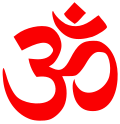Pitri
The pitris (
The
Development
According to popular belief, the fire deity, Agni, is believed to carry the deceased to Pitrloka with the smoke that emerges during cremation.[7]
The pitrs are often likened to birds, as they are described to always be looking down on earth; the ancient Baudhayana stated that pitrs assume the form of birds. This led to the practice of feeding birds during funeral rites, and rituals associated with ancestor veneration.[8]
Texts like the Mahabharata establish the concept of the living performing pious deeds for the benefit of their departed ancestors. Rather than a form of worship, it is stated to be the duty of every male descendant to perform rites for their pitrs.[9]
Sayana, a scholar of the Vijayanagara Empire, regarded every individual born to be under the debt of their pitrs. This debt is redeemed by continuing the race, which is done by procreation. This act is stated to protect and offer longevity from the pitrs. The world of the pitrs, according to him, could only be achieved by the pious, and is unreachable by those who hate Hindu deities or injure Brahmins.[10]
Literature
Pitrs have been featured in Hinduism since the Rigveda, with hymns invoking Agni to decide which offerings should go to the devas, and which to one's pitrs.[11] In this text, the Pitrloka and Devaloka are regarded to be indistinct. They are regarded to be distinct in the Atharvaveda, and in the Brahmanas, Devaloka becomes preferable to attain to the Pitroka.[12]
The Manusmriti states that a son born of the Brahma marriage absolves the sins of ten pitrs on the ascending side, and ten on the descending side of his family, as well as himself as the twenty-first.[13]
The
According to the Puranas, the first pitrs were the Prajapatis, the progenitors of the human race. After the performance of a penance, Brahma is described to have ordered the devas, who had ceased to worship him, to acquire instruction from their sons regarding the manner of devotion and veneration. The devas were forced to call their own sons pitrs - fathers.[15][16]
The most complete accounts about the pitrs are found in the
The Vishnu Purana states that the most devout of Brahmins go to Pitrloka.[18]
In the Mahabharata, while Yudhishthira talks to Bhishma upon his bed of arrows, the latter states that whether one is a deva or asura, a human being, gandharva or uraga or rakshasa, pisaca or kinnara, one must always venerate one's pitrs. He states that performing the Shraddha ritual on each successive day of the lunar fortnight, one reaps merits, such as acquiring beautiful spouses and successful children on the first day, daughters on the second day, steeds on the third day, and so on.[19]
The pitrs are most primeval deities and they never cease to exist. The manuṣyāḥ pitaraḥ (ancestors of human beings) can attain the same level of the divine pitrs and live with them in Svarga by righteousness.[citation needed]
They are reborn at the end of every thousand
Legends
The legend of Aurva from the Mahabharata features the sage's pitrs appearing before him to request him to cease his penance, which produces the Vadavagni.[21]
A legend from the
The Brahmanda Purana narrates the episode of Pururavas propitiating his pitrs.[23]
A legend from the Skanda Purana explains the origin of the Shraddha ritual, stating that not offering these rites to one's ancestors during the amavasya (new moon day) will lead to one's pitrs suffering from hunger and thirst.[24]
The legend of Bhagiratha features the king performing arduous penances to Ganga and Shiva, to free his ancestors from Patala, where they had been destroyed by Kapila.[25]
Classes
There are seven classes of the devāḥ pitaraḥ (divine pitrs), three of them are amurtayah (incorporeal) while the other four are samurtayah (corporeal). The three incorporeal orders of the pitrs are Vairajas, Agnishvattas and Barhishadas. The four corporeal orders of the pitrs are Somapas, Havishmanas, Ajyapas, and Sukalins (or Manasas).[26]
The Pitṛ-Vaṁśa
All seven classes of the divine pitrs had each one mānasī kanyā (mind-born daughter). Mena, the wife of Mount
See also
References
- ISBN 978-1-135-18978-5.
- ISBN 978-81-208-3907-6.
- ISBN 978-81-206-1304-1.
- ISBN 978-1-59884-205-0.
- ^ The Vishńu Puráńa (Vishṇupurāṇam), a System of Hindu Mythology and Tradition, Translated from the Original Sanscrit, and Illustrated by Notes Derived Chiefly from Other Puráńas, by H. H. Wilson. 1840. p. 329.
- ISBN 978-81-208-0597-2.
- ISBN 978-0-691-23401-4.
- ISBN 978-81-7022-375-7.
- ISBN 978-81-208-1700-5.
- ISBN 978-81-7024-867-5.
- ^ www.wisdomlib.org (2021-08-27). "Rig Veda 10.16.11 [English translation]". www.wisdomlib.org. Retrieved 2022-11-26.
- ISBN 978-1-108-49955-2.
- ^ www.wisdomlib.org (2016-10-28). "Manusmriti Verse 3.37". www.wisdomlib.org. Retrieved 2022-11-26.
- ISBN 978-81-7154-832-3.
- ISBN 978-1-135-18978-5.
- ^ www.wisdomlib.org (2018-11-03). "The power of the Manes (pitṛ) [Chapter 40]". www.wisdomlib.org. Retrieved 2022-11-26.
- ^ www.wisdomlib.org (2014-09-07). "Pitri, Pitṛ: 26 definitions". www.wisdomlib.org. Retrieved 2022-11-26.
- ^ www.wisdomlib.org (2014-08-30). "Origin of the four castes [Chapter VI]". www.wisdomlib.org. Retrieved 2022-11-26.
- ^ www.wisdomlib.org (2021-08-18). "Section LXXXVII [Mahabharata, English]". www.wisdomlib.org. Retrieved 2022-11-26.
- ^ Pargiter, F.E (1922, reprint 1972). Ancient Indian Historical Tradition, Delhi: Motilal Banarsidass, pp. 46-7
- ^ www.wisdomlib.org (2019-01-28). "Story of Aurva". www.wisdomlib.org. Retrieved 2022-11-26.
- ISBN 978-81-208-0597-2.
- ^ www.wisdomlib.org (2019-06-19). "Meeting of Purūravas and Pitṛs [Chapter 28]". www.wisdomlib.org. Retrieved 2022-11-26.
- ^ www.wisdomlib.org (2021-01-18). "Origin of Śrāddha [Chapter 216]". www.wisdomlib.org. Retrieved 2022-11-26.
- ISBN 978-93-86004-23-9.
- ^ www.wisdomlib.org (2019-01-28). "Story of Pitṛ". www.wisdomlib.org. Retrieved 2022-11-26.
- ^ Pargiter, F.E (1922, reprint 1972). Ancient Indian Historical Tradition, Delhi: Motilal Banarsidass, p.69
External links
- Dallapiccola, Anna: Dictionary of Hindu Lore and Legend (ISBN 0-500-51088-1).


